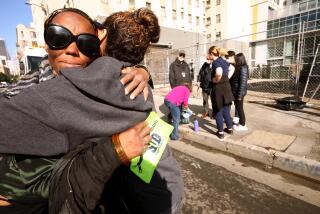A Rare Breed
- Share via
In his nearly 50 years of practice, Dr. Ethan Allen of Norwalk has heard all the arguments from his colleagues who don’t make house calls.
“They figure if people need a house call, they need to be in a hospital or at least the emergency room,” says the 74-year-old Allen.
“They say house calls are not lucrative enough.”
But Allen, who now makes about 20 house calls a month, including trips to nearby convalescent homes, is not about to stop bucking a trend. Ever since he set up his practice in Norwalk more than 46 years ago, he has offered house calls to patients who couldn’t make it to the office.
In the 1950s, he would often see children whose mothers stayed home to care for them but had no transportation because the fathers needed the family car to get to work. Even then, the house call was uncommon, with about 10% of all physician-patient encounters taking place in the home, down from 40% in the 1930s.
These days, when the white-haired, bespectacled physician sets out from his office on Studebaker Road for a house call, he is usually destined for the home of an elderly patient.
Allen is truly one of a “vanishing breed,” according to researchers who analyzed the practice of making house calls to elderly patients and published their findings in December in the New England Journal of Medicine. While other home health-care services, such as visits by home health-care aides, have skyrocketed, house calls by physicians have dramatically declined, according to research reported by the Uniformed Services University of the Health Sciences and Walter Reed Army Medical Center.
*
From 1988 to 1993, physician house calls billed to Medicare declined from 1.6 million to 1.1 million per year. In 1996, house calls billed to Medicare dropped even more, to about 984,000.
House calls paid for by Medicare must be deemed medically necessary, says Lourdes Maloney, a manager at the Health Care Financing Administration, which oversees Medicare. For an established patient in the Los Angeles area, the median rate for a house call would be $64, with 80% of that reimbursed, she says. For the same patient, the median rate for an office visit would be $43, also 80% reimbursable.
Despite the decline, generalist physicians still perceive house calls as valuable, according to other research reported in the New England Journal article citing surveys published in the American Family Physician and other publications. House calls can provide personal gratification and improve patient satisfaction, among other benefits.
But there are obstacles, says Frank Clark, executive vice president of the Los Angeles County Medical Assn., who says he suspects few of the association’s members make house calls these days, although no hard and fast statistics are available. Liability is one issue, he says. Also, doctors can’t provide as much care, since heavy diagnostic equipment can’t be taken into the home. Fear of going into dangerous neighborhoods is another common deterrent, Clark says.
Those who are more likely to make house calls are generalists, osteopaths, and are older, male, board-certified doctors who practice in the Northeast and are in solo practice, according to the New England Journal report.
The researchers also found that fewer than 1% of elderly Medicare patients receive house calls from doctors, and those who do are very sick and near the end of their lives.
*
When Allen, a family practice osteopathic physician, visits his homebound patients, as he did on a recent sunny Friday afternoon, they seem to be suddenly full of life.
His first stop is the Santa Fe Springs home of Margaret Dodge, 86, who is sitting in her wheelchair in front of the television but gladly puts her Al Jolson movie on hold for Allen. A year ago, she was in a coma because of uncontrolled diabetes and was not expected to live. She recovered slowly at a hospital and then at a convalescent hospital. “I have been seeing her at home for the last four months,” Allen says.
Digging into his small black bag, he takes Dodge’s blood pressure, checks her over and follows up with a previous ear wax problem. Today, everything checks out fine.
“It’s nice he cares enough to do this,” Dodge says. “It’s something very few doctors do.”
Dodge’s daughter Marge Horton, who helps care for her mother with help from her husband, Henry, and her sister, Mary Flamm, says the house calls have another benefit. Their dad, Harry, 90, avoids doctors whenever possible. But he has allowed Allen to examine him, too, during some of the home visits.
Next on the afternoon call sheet is Edith Stevenson, 92, of Norwalk, who’s been a patient of Allen’s for 35 years, and is receiving her first house call. She had undergone surgery for colon cancer, then gone to a convalescent home and has been back at her own place for just three days.
Soon after Allen steps inside, Stevenson shows off her special recliner chair. “Has it ever thrown you out?” Allen asks, his blue eyes sparkling.
After taking Stevenson’s blood pressure, checking her ears and administering a vitamin B complex injection, Allen also examines the feeding tube that helps ensure an adequate intake of calories.
Then he discusses doses of medicines, prescription and over-the-counter, with Stevenson’s daughter, Leola Mooney.
Then his patient pipes up. “Can I eat anything?”
After thinking it over, Allen tells her to stick with a healthy, bland diet. “I don’t think pizza or potato chips. . . .”
“Can I drink Coke?” she wants to know.
“Once in a while,” Allen says. “I don’t want to destroy your teeth.”
Stevenson, who wears dentures, laughs.
Half an hour later, Allen is zipping back to his office in his silver Ford Taurus.
*
During his career, Allen, who is also a clinical professor of osteopathic medicine at the Western University of Health Sciences (formerly the College of Osteopathic Medicine of the Pacific), was instrumental in reestablishing licensure in California for osteopaths when a 1962 state initiative proposed merging osteopathic licensure with that of MDs.
With his wife, Alice, Allen has also established an anti-drug abuse coalition, now known as the Los Angeles Centers of Alcohol and Drug Abuse.
The house call part of his practice is clearly dear to his heart. For one thing, he likes the think-on-your-feet requirement. “You have to make decisions on the spot,” he says.
And there’s the overwhelming gratitude of patients and families. At his office, he retrieves a memorial card distributed at the funeral of a former house call patient, on which he is prominently thanked.
When his house call patients ask, worriedly, if he has any plans to retire, he gives them all the same answer. “I tell them, not for about 3 1/2 years. That will make 50 years in practice and take me into the next century.”
More to Read
Sign up for Essential California
The most important California stories and recommendations in your inbox every morning.
You may occasionally receive promotional content from the Los Angeles Times.













